We value your privacy
We use cookies to allow this site to work for you, improve your user experience, and to serve you advertising tailored to your interests. Let us know if you agree to all cookies. You can manage your preferences at any time

Your Privacy
We use cookies, which are small text files placed on your computer, to allow the site to work for you, improve your user experience, to provide us with information about how our site is used, and to deliver personalised ads which help fund our work and deliver our service to you for free.
The information does not usually directly identify you, but it can give you a more personalised web experience.
You can accept all, or else manage cookies individually. However, blocking some types of cookies may affect your experience of the site and the services we are able to offer.
You can change your cookies preference at any time by visiting our Cookies Notice page. Please remember to clear your browsing data and cookies when you change your cookies preferences. This will remove all cookies previously placed on your browser.
For more detailed information about the cookies we use, or how to clear your browser cookies data see our Cookies Notice
Manage consent preferences
These cookies are necessary for the website to function and cannot be switched off in our systems.
They are essential for you to browse the website and use its features.
You can set your browser to block or alert you about these cookies, but some parts of the site will not then work. We can’t identify you from these cookies.
These help us personalise our sites for you by remembering your preferences and settings. They may be set by us or by third party providers, whose services we have added to our pages. If you do not allow these cookies, then these services may not function properly.
These cookies allow us to count visits and see where our traffic comes from, so we can measure and improve the performance of our site. They help us to know which pages are popular and see how visitors move around the site. The cookies cannot directly identify any individual users.
If you do not allow these cookies we will not know when you have visited our site and will not be able to improve its performance for you.
These cookies may be set through our site by social media services or our advertising partners. Social media cookies enable you to share our content with your friends and networks. They can track your browser across other sites and build up a profile of your interests. If you do not allow these cookies you may not be able to see or use the content sharing tools.
Advertising cookies may be used to build a profile of your interests and show you relevant adverts on other sites. They do not store directly personal information, but work by uniquely identifying your browser and internet device. If you do not allow these cookies, you will still see ads, but they won’t be tailored to your interests.
Personalise what you see on this page.
- United States
LOOKING FOR
- Undergraduate courses
- Postgraduate courses
- CHOOSE ONE OR MORE
Popular universities
- University of Kent
- University of East Anglia UEA
- University of Chester
- Coventry University
- University of Aberdeen
- University of Portmouth
- Nottingham Trent University
- University of Sunderland
- London Metropolitan University
- London South Bank University
- University of East London
- BROWSE ALL UNIVERSITIES
Course search
Popular undergraduate courses.
- Computer Science
- LLB Bachelor of Laws
- Biomedical Sciences
- Physiotherapy
- Sports Science
Open days search
Upcoming open days.
- BIMM University
- Falmouth University
- University of Greenwich
Article search
Popular topics.
- League tables
- Choosing what to study
- Financing your studies
- Choosing where to study
- Career prospects
Popular articles
- How to use the league tables
- Helping you decide where and what to study
- Why use our university league tables?
- Types of degrees in the UK
- How to revise for exams: Top tips
- BROWSE ALL ADVICE
Electronic and Electrical Engineering MPhil/PhD UCL (University College London)

Course options
Qualification.
PhD/DPhil - Doctor of Philosophy
UCL (University College London)
- TUITION FEES
- ENTRY REQUIREMENT
- UNIVERSITY INFO
Course summary
Thanks to the breadth of research we carry out in the department, we offer doctorates across a wide range of topics in electrical engineering from nanotechnology and novel materials, to circuits and systems, radar, communications, photonics and optical networks and large scale networks. We collaborate widely, both with other departments in UCL, and internationally with leading research groups around the world.
Many of our recent PhD graduates have taken up positions as postdoctoral researchers at leading universities, whilst others continue their research careers in industry. A significant number use the PhD as a stepping stone to careers in other sectors, including management consultancy and finance. Several have started up their own businesses and become successful entrepreneurs.
Our research students are in high demand post-graduation, going on to take up careers in industry, in academic research as postdoctoral researchers, and in many cases continuing to permanent academic positions at such institutions as the University of Liverpool; Queen Mary, University of London; University of British Columbia; Aston University; City University and the University of Hokkaido. Many of our students have taken up senior positions in industry at such companies as Alcatel-Lucent, Nokia-Siemens, Deutsche Telekom, and some have taken up Directorships. Several graduates have been awarded prestigious fellowships, including Royal Academy of Engineering and Royal Society University Fellowships, Leverhulme Trust Early Career Awards and EPSRC Fellowships.
Tuition fees
- Afghanistan
- Antigua & Barbuda
- Bosnia and Herzegovina
- Burkina Faso
- Central African Republic
- Congo (Democratic Republic)
- Czech Republic
- Dominican Republic
- El Salvador
- Equatorial Guinea
- Guinea-Bissau
- Ivory Coast
- Korea DPR (North Korea)
- Liechtenstein
- Marshall Islands
- Netherlands
- New Zealand
- Northern Ireland
- Palestinian Authority
- Papua New Guinea
- Philippines
- Puerto Rico
- Republic of Ireland
- Sao Tome and Principe
- Saudi Arabia
- Sierra Leone
- Solomon Islands
- South Africa
- South Korea
- South Sudan
- St. Kitts & Nevis
- Switzerland
- Trinidad & Tobago
- Turkmenistan
- United Kingdom
- Vatican City
- Western Samoa
£ 29,000 per year
Tuition fees shown are for indicative purposes and may vary. Please check with the institution for most up to date details.
University information
University league table, campus address.
UCL (University College London), Gower Street, London, Camden, WC1E 6BT, England
Subject rankings
Subject ranking.
4th out of 68
Entry standards
Graduate prospects
Student satisfaction
Suggested courses

Advanced Electronic and Electrical Engineering MSc
Brunel University London
University league table
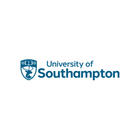
Electronic Engineering (MSc)
University of Southampton
Electrical & Electronic Engineering league table

Electronics and Electrical Engineering MSc
University of Glasgow
Is this page useful?
Sorry about that..., how can we improve it, thanks for your feedback.
Our cookies
We use cookies for three reasons: to give you the best experience on PGS, to make sure the PGS ads you see on other sites are relevant , and to measure website usage. Some of these cookies are necessary to help the site work properly and can’t be switched off. Cookies also support us to provide our services for free, and by click on “Accept” below, you are agreeing to our use of cookies .You can manage your preferences now or at any time.
Privacy overview
We use cookies, which are small text files placed on your computer, to allow the site to work for you, improve your user experience, to provide us with information about how our site is used, and to deliver personalised ads which help fund our work and deliver our service to you for free.
The information does not usually directly identify you, but it can give you a more personalised web experience.
You can accept all, or else manage cookies individually. However, blocking some types of cookies may affect your experience of the site and the services we are able to offer.
You can change your cookies preference at any time by visiting our Cookies Notice page. Please remember to clear your browsing data and cookies when you change your cookies preferences. This will remove all cookies previously placed on your browser.
For more detailed information about the cookies we use, or how to clear your browser cookies data see our Cookies Notice
Manage consent preferences
Strictly necessary cookies
These cookies are necessary for the website to function and cannot be switched off in our systems.
They are essential for you to browse the website and use its features.
You can set your browser to block or alert you about these cookies, but some parts of the site will not then work. We can’t identify you from these cookies.
Functional cookies
These help us personalise our sites for you by remembering your preferences and settings. They may be set by us or by third party providers, whose services we have added to our pages. If you do not allow these cookies, then these services may not function properly.
Performance cookies
These cookies allow us to count visits and see where our traffic comes from, so we can measure and improve the performance of our site. They help us to know which pages are popular and see how visitors move around the site. The cookies cannot directly identify any individual users.
If you do not allow these cookies we will not know when you have visited our site and will not be able to improve its performance for you.
Marketing cookies
These cookies may be set through our site by social media services or our advertising partners. Social media cookies enable you to share our content with your friends and networks. They can track your browser across other sites and build up a profile of your interests. If you do not allow these cookies you may not be able to see or use the content sharing tools.
Advertising cookies may be used to build a profile of your interests and show you relevant adverts on other sites. They do not store directly personal information, but work by uniquely identifying your browser and internet device. If you do not allow these cookies, you will still see ads, but they won’t be tailored to your interests.
Course type
Qualification, university name, postgraduate electronic and electrical engineering courses at ucl (university college london).
5 courses available
Customise your search
Select the start date, qualification, and how you want to study

Related subjects:
- Electronic and Electrical Engineering
- Electrical Engineering
- Electronic Engineering

- Course title (A-Z)
- Course title (Z-A)
- Price: high - low
- Price: low - high
Smart Buildings and Digital Engineering MSc
Ucl (university college london).
The Smart Buildings and Digital Engineering (SBDE) MSc offers a thorough grounding in the science and engineering of building systems Read more...
- 5 years Customised degree
- 1 year Full time degree: £18,000 per year (UK)
- 2 years Part time degree: £9,000 per year (UK)
Connected Electronic and Photonic Systems MRes
The MRes in Connected Electronic and Photonic Systems is taught at the EPSRC Centre for Doctoral Training, a joint centre with UCL and the Read more...
- 1 year Full time degree: £5,860 per year (UK)
Advanced Propulsion MSc
Our new MSc will train the next generation of engineers and scientists to address the challenges of Net Zero in the areas of batteries, Read more...
Electronic and Electrical Engineering MPhil/PhD
Thanks to the breadth of research we carry out in the department, we offer doctorates across a wide range of topics in electrical Read more...
- 3 years Full time degree: £6,035 per year (UK)
- 5 years Part time degree: £2,930 per year (UK)
Digital Engineering Management MSc
There has been a radical digital shift in the built environment sector, particularly in construction. The Digital Engineering Management Read more...
- 1 year Full time degree: £21,200 per year (UK)
- 2 years Part time degree: £10,600 per year (UK)
Course type:
Qualification:, related subjects:.

- Recommendations
- Notifications
- My Favorites
Favorites, recommendations, and notifications are only available for UCLA Graduate Students at this time.
Access features exclusively for UCLA students and staff.
As a student, you can:
- Add funding awards to your favorites list
- Get notified of upcoming deadlines and events
- Receive personalized recommendations for funding awards
We're Sorry
You've signed in with a UCLA undergraduate student account.
UCLA Graduate Programs

Graduate Program: Electrical & Computer Engineering
UCLA's Graduate Program in Electrical & Computer Engineering offers the following degree(s):
Master of Science (M.S.)
Doctor of Philosophy (Ph.D.)
With questions not answered here or on the program’s site (above), please contact the program directly.
Electrical & Computer Engineering Graduate Program at UCLA 420 Westwood Plaza 57-127 Engineering IV, attn: Office of Graduate Student Affairs Box 951594 Los Angeles, CA 90095-1594
Visit the Electrical & Computer Engineering’s faculty roster
COURSE DESCRIPTIONS
Visit the registrar's site for the Electrical & Computer Engineering’s course descriptions
- Admission Requirements
- Program Statistics
(310) 825-9383
MAJOR CODE: ELECTRICAL & COMPUTER ENGINEERING

Electrical Engineering (PhD)
Program at a glance.
- In State Tuition
- Out of State Tuition
Learn more about the cost to attend UCF.

The Electrical Engineering PhD (one of the three PhD programs offered by the School of EECS) prepares students for careers in research or academia with specializations including Communications, Digital Signal Processing/Image Processing, Controls and Robotics, Electromagnetics, Electro-Optics, Photonics, Power Electronics and Electronics, Solid-State/Microelectronics, and VLSI Design.
The specific research that each one of the EECS faculty conduct can be found at the School of EECS website ( www.eecs.ucf.edu ).
The Doctor of Philosophy in Electrical Engineering is primarily intended for students with a master's degree in Electrical Engineering or a closely related discipline who wish to pursue a career in research or academia. Specializations include Communications, Digital Signal Processing/Image Processing, Controls and Robotics, Electromagnetics, Electro-Optics, Photonics, Power Electronics and Electronics, and Solid-State/Microelectronics.
Research interests of the Electrical Engineering faculty include antennas, microwave and millimeter circuits/devices, communication systems, digital signal/image processing, power electronics, electronic circuits, IFF devices, electromagnetic theory, radar and microwave remote sensing, speech processing, VLSI design, spread spectrum systems, SAW and ACT devices, spectral estimation, solid state device modeling and computer-aided design (CAD) techniques, communication networks, integrated services digital networks, neural networks, systems and controls, robotics, robust control, computer control, microelectronics, semiconductors, thin films, power system stability, bipolar device modeling, solid state lasers, optical propagation, fiber optics, optical signal processing, laser-induced damage, optical testing, diffractive optics, phase conjunction, infrared detectors, Fourier optics, lens design, and nonlinear optics.
The Electrical Engineering PhD degree requires a minimum of 72 credit hours beyond the bachelor's degree. Of these 72 hours, a minimum of 36 credit hours must be formal coursework, exclusive of independent study coursework. A minimum of 15 credit hours with up to a maximum of 24 credit hours of dissertation hours can be credited toward the degree. No more than 12 credit hours of Independent Study are allowed. The remaining hours can be a combination of formal coursework and/or pre-candidacy doctoral research.
Total Credit Hours Required: 72 Credit Hours Minimum beyond the Bachelor's Degree
This program has potential ties to professional licensure or certification in the field. For more information on how this program may prepare you in that regard, please view the licensure disclosure for the Electrical Engineering PhD program.
Application Deadlines
- International
Ready to get started?
University of central florida colleges.

Request Information
Enter your information below to receive more information about the Electrical Engineering (PhD) program offered at UCF.
Program Prerequisites
Bachelor's or Master's degree in Electrical Engineering or a closely related discipline.
Undergraduate articulation courses are required to be completed prior to admission for students who do not hold a Bachelor of Science degree in Electrical Engineering. In particular, the articulation courses specified below, plus all of the prerequisite string which any of them require, must be completed prior to admission. Grades of "B" or higher must be obtained in each articulation course specified below. Articulation courses are not eligible for inclusion on a graduate Program of Study.
- EEL 3123C Network and Systems
- EEE 3307C Electronics I
- EEL 3470 Electromagnetic Fields
- EEL 3552 Signal Analysis and Communications
- EEE 3350 Semiconductor Devices I
In addition, choose one of the following:
- EEL 3657 Linear Control Systems
- EEE 4309C Electronics II
- EEL 4750 Digital Signal Processing Fundamentals
Degree Requirements
Required courses.
- The Electrical Engineering Program supports a number of specialization areas. These technical areas are (in alphabetical order): Electromagnetics and Optics (EO), Signal Processing and Systems (SPS), and Micro-Systems and Nano-Systems (MNS). The Micro-Systems and Nano-Systems area covers the typical Electrical Engineering topic areas of Electronics, Power Electronics and Micro-Electronics, while the Signal Processing and Systems area covers the typical electrical topic areas of communications, controls, and signal processing. Please visit the department’s website (https://www.ece.ucf.edu/people/faculty-by-research-area/) for a list of faculty within each specialization area. For each one of these areas there is a suggested list of courses stated below. Students are also allowed to take courses from other specialization areas, but the majority of their courses should be chosen from courses in their specialization area. A majority of specialization classes is at least 19 credit hours, typically 7 graduate courses.
- EEE5542 - Random Processes I (3)
- EEE5557 - Introduction to Radar Systems (3)
- EEL5437C - Microwave Engineering (4)
- EEL5439C - RF and Microwave Active Circuits (4)
- EEL5462 - Antenna Analysis and Design (3)
- EEL6425C - RF and Microwave Measurement Techniques (4)
- EEL6482 - Electromagnetic Theory I (3)
- EEL6481 - Numerical Techniques in Electromagnetics (3)
- EEL6489 - Advanced Topics in Electromagnetics and Microwaves (3)
- EEL6504 - Wireless Communications (3)
- EEL6530 - Communication Theory (3)
- MAP5426 - Special Functions (3)
- MAP5435 - Advanced Mathematics for Engineers (3)
- MAP6424 - Transform Methods (3)
- OSE5041 - Introduction to Wave Optics (3)
- OSE5414 - Fundamentals of Optoelectronic Devices (3)
- OSE6111 - Optical Wave Propagation (3)
- OSE5115 - Interference and Diffraction (3)
- OSE6143 - Fiber Optics Communication System (3)
- OSE6211 - Imaging and Optical Systems (3)
- OSE6445 - Fundamentals of Ultrafast Optics (3)
- OSE6455C - Photonics Laboratory (3)
- OSE6615L - Optoelectronic Device Fabrication Laboratory (3)
- OSE5525 - Laser Engineering (3)
- BME5572 - Biomedical Nanotechnology (3)
- EEL5245 - Power Electronics (3)
- EEE5332C - Thin Film Technology (3)
- EEE5352 - Semiconductor Material and Device Characterization (3)
- EEE5353 - Semiconductor Device Modeling and Simulation (3)
- EEE5356C - Fabrication of Solid-State Devices (4)
- EEE5370 - Operational Amplifiers (3)
- EEE5378 - CMOS Analog and Digital Circuit Design (3)
- EEE5390C - Full-Custom VLSI Design (3)
- EEE5555 - Surface Acoustic Wave Devices and Systems (3)
- EEE6317 - Power Semiconductor Devices and Integrated Circuits (3)
- EEE6358 - Advanced Semiconductor Device I (3)
- EEL6246 - Power Electronics II (3)
- EEE6326C - MEMS Fabrication Laboratory (3)
- EEE6338 - Advanced Topics in Microelectronics (3)
- EEE5513 - Digital Signal Processing Applications (3)
- EEE6504 - Adaptive Digital Signal Processing (3)
- EEL5173 - Linear Systems Theory (3)
- EEL5630 - Digital Control Systems (3)
- EEL5669 - Introduction to Robotics and Autonomous Vehicles (3)
- EEL5820 - Image Processing (3)
- EEL6026 - Optimization of Engineering Systems (3)
- EEL6590 - Advanced Topics in Communications (3)
- EEL6619 - Nonlinear Robust Control and Applications (3)
- EEL6621 - Nonlinear Control Systems (3)
- EEL6662 - Advanced Robotics (3)
- EEL6667 - Mobile Robotic Systems (3)
- EEL6671 - Modern and Optimal Control Systems (3)
- EEL6674 - Optimal Estimation for Control (3)
- EEL6616 - Adaptive Control (3)
- EEL6683 - Cooperative Control of Networked Autonomous Systems (3)
- EEL6812 - Introduction to Neural Networks and Deep Learning (3)
- CAP5415 - Computer Vision (3)
- CAP6419 - 3D Computer Vision (3)
- CAP6411 - Computer Vision Systems (3)
- CAP6412 - Advanced Computer Vision (3)
Elective Courses
- Earn at least 21 credits from the following types of courses: Additional elective courses listed above. - May include formal coursework, directed research hours, doctoral research hours, dissertation research, and no more than 12 credit hours of Independent Study.
Dissertation
- Earn at least 15 credits from the following types of courses: XXX 7980 Dissertation Research The program will only allow students to complete up to 24 hours of dissertation coursework in XXX 7980. The College of Engineering and Computer Science requires that all dissertation defense announcements are approved by the student's adviser and posted on the college's website at least two weeks before the defense date.
Qualifying Review
- The Qualifying Review relies on annual appraisals of the student's progress conducted by the student's research/academic adviser and advisory committee, once formed. The student's appraisal template that the adviser completes will assess the student's academic performance (course performance) and research performance. On an annual basis, and based on the completed PhD Student Annual Review template, as well as additional student documentation attached with approval of the adviser, the EECS Graduate Committee will rate the student's performance as "Above Expectation," "At Expectation," or "Below Expectation" toward the completion of the PhD degree. Students must pass the Qualifying Review no later than the deadline, which is the semester in which they complete 24 credit hours after admission or within two calendar years after admission, whichever occurs later. If a student has passed the Qualifying Review, then the student is eligible to continue PhD studies. However, a student who does not pass the Qualifying Review by the deadline will be dismissed from the degree program and will be given the opportunity to complete a master's degree (if applicable).
Dissertation Committee
- PhD Dissertation Committees for this degree program must have all of the below characteristics: - consist of at least five committee members including the committee chair - the committee chair must be either a Regular Appointment faculty member in EECS or a Secondary-Joint Appointment faculty member in EECS - at least 50% of committee members (when tabulated including the chair) must be EECS regular faculty - the majority of committee members must vote in favor of passing for the student to Pass - in addition to the above, all college and university requirements (such as one member outside of EECS) must be met. Joint faculty members may serve as committee chairs, but graduate faculty scholars may not serve as committee chairs.
Candidacy Examination
- After passing the Qualifying Review, students are required to successfully complete the candidacy examination in order to demonstrate readiness for preliminary research in a chosen field of study. This exam is administered by the student's dissertation advisory committee. Preparedness for taking the candidacy examination requires that the student must demonstrate his/her readiness for the PhD program in Electrical Engineering by authoring an accepted journal article or high-quality conference paper. The student must be the first author on this paper and the research advisor must also be an author on this paper to be used for Candidacy. The publication should reflect the work related to the student's PhD research. Candidacy is normally attempted at the completion of required coursework and must be passed before registering for doctoral dissertation hours (EEL 7980). Continuous enrollment in at least 3 hours of doctoral dissertation hours is required once a student starts taking dissertation credits.
Admission to Candidacy
- The following are required to be admitted to candidacy and enroll in dissertation hours. - Completion of all required formal coursework, except for dissertation hours. - Successful completion of the candidacy examination. - The dissertation advisory committee is formed, consisting of approved graduate faculty and graduate faculty scholars. - Submission of an approved program of study. Signed and well-formed Doctoral Committee Candidacy Status form and associated paperwork (dissertation advisory committee and program of study, etc.) must be submitted to the Electrical and Computer Engineering Graduate Office for processing on or before the last day to defend Dissertation during the semester prior to enrolling in dissertation credits.
Dissertation Proposal Exam
- After passing the candidacy examination, the student will write a dissertation proposal and present it to the dissertation advisory committee for approval. The proposal must include a description of the research performed to date and the research planned to be completed for the dissertation. The presentation of a written dissertation proposal must be deemed as passing requirements by the majority of the dissertation committee.
Grand Total Credits: 72
Application requirements, financial information.
Graduate students may receive financial assistance through fellowships, assistantships, tuition support, or loans. For more information, see the College of Graduate Studies Funding website, which describes the types of financial assistance available at UCF and provides general guidance in planning your graduate finances. The Financial Information section of the Graduate Catalog is another key resource.
Fellowship Information
Fellowships are awarded based on academic merit to highly qualified students. They are paid to students through the Office of Student Financial Assistance, based on instructions provided by the College of Graduate Studies. Fellowships are given to support a student's graduate study and do not have a work obligation. For more information, see UCF Graduate Fellowships, which includes descriptions of university fellowships and what you should do to be considered for a fellowship.
Formal coursework required is 36 credit hours, exclusive of independent study and research. A minimum of 15 credit hours of dissertation hours are required. All other credit hours will be determined with a faculty adviser. Students admitted with an earned master's degree may request to have up to 30 of those credit hours counted toward their doctoral program. The student's doctoral adviser in conjunction with the graduate office will determine the precise number of hours to be counted subject to Graduate Studies regulations.
The Program of Study (POS) form must be approved by an adviser in the selected specialization area no later than the end of the second semester after admission. The program of study must meet all the university requirements specified in the graduate catalog. Details about this program are located in the Electrical Engineering PhD Handbook.
Students in the Electrical Engineering PhD program pay a $90 equipment fee each semester that they are enrolled. Part-time students pay $45 per semester.
The Independent Learning Requirement is met by successful completion of the student's candidacy and dissertation defense examinations.
Electrical Engineering PhD
The Electrical Engineering PhD program studies systems that sense, analyze, and interact with the world. You will learn how this practice is based on fundamental science and mathematics, creating opportunities for both theoretical and experimental research. Electrical engineers invent devices for sensing and actuation, designing physical substrates for computation, creating algorithms for analysis and control, and expanding the theory of information processing. You will get to choose from a wide range of research areas such as circuits and VLSI, computer engineering and architecture, robotics and control, and signal processing.
Electrical engineers at SEAS are pursuing work on integrated circuits for cellular biotechnology, millimeter-scale robots, and the optimization of smart power groups. Examples of projects current and past students have worked on include developing methods to trace methane emissions and improving models for hurricane predictions.
APPLY NOW >
PhD in Electrical Engineering Degree
Harvard School of Engineering offers a Doctor of Philosophy (Ph.D.) degree in Engineering Sciences: Electrical Engineering , conferred through the Harvard Kenneth C. Griffin Graduate School of Arts and Sciences (Harvard Griffin GSAS). Prospective students apply through the Harvard Griffin GSAS. In the online application, select “Engineering and Applied Sciences” as your program choice and select " PhD Engineering Sciences: Electrical Engineering ."
The Electrical Engineering program does not offer an independent Masters Degree.
Electrical Engineering PhD Career Paths
Graduates of the program have gone on to a range of careers in industry in companies such as Tesla, Microsoft HoloLens, and IBM. Others have positions in academia at the University of Maryland, University of Michigan, and University of Colorado.

Admissions & Academic Requirements
Prospective students apply through the Harvard Kenneth C. Griffin Graduate School of Arts and Sciences (Harvard Griffin GSAS). In the online application, select “Engineering and Applied Sciences” as your program choice and select "PhD Engineering Sciences: Electrical Engineering." Please review the admissions requirements and other information before applying. Our website also provides admissions guidance , program-specific requirements , and a PhD program academic timeline .
Academic Background
Applicants typically have bachelor’s degrees in the natural sciences, mathematics, computer science, or engineering. In the application for admission, select “Engineering and Applied Sciences” as your degree program choice and your degree and area of interest from the “Area of Study“ drop-down. PhD applicants must complete the Supplemental SEAS Application Form as part of the online application process.
Standardized Tests
GRE General: Not Accepted
Electrical Engineering Faculty & Research Areas
View a list of our electrical engineering faculty and electrical engineering affiliated research areas , Please note that faculty members listed as “Affiliates" or "Lecturers" cannot serve as the primary research advisor.
Electrical Engineering Centers & Initiatives
View a list of the research centers & initiatives at SEAS and the electrical engineering faculty engagement with these entities .
Graduate Student Clubs
Graduate student clubs and organizations bring students together to share topics of mutual interest. These clubs often serve as an important adjunct to course work by sponsoring social events and lectures. Graduate student clubs are supported by the Harvard Kenneth C. Griffin School of Arts and Sciences. Explore the list of active clubs and organizations .
Funding and Scholarship
Learn more about financial support for PhD students.
- How to Apply
Learn more about how to apply or review frequently asked questions for prospective graduate students.
In Electrical Engineering
- Undergraduate Engineering at Harvard
- Concentration Requirements
- How to Declare
- Who are my Advisors?
- Sophomore Forum
- ABET Information
- Senior Thesis
- Research for Course Credit (ES 91R)
- AB/SM Information
- Peer Concentration Advisors (PCA) Program
- Student Organizations
- PhD Timeline
- PhD Model Program (Course Guidelines)
- Qualifying Exam
- Committee Meetings
- Committee on Higher Degrees
- Research Interest Comparison
- Collaborations
- Cross-Harvard Engagement
- Seminar Series
- Clubs & Organizations
- Centers & Initiatives
- Alumni Stories

Medical Physics and Biomedical Engineering
- PhD Studentship Vacancy

Quantum sensing with nanodiamonds in biological systems (23033)
Four Year Funded Studentship. Application Deadline: ongoing till position filled
Quantum sensing with nanodiamonds in biological systems
Primary supervisor: Dr Benjamin Miller
Co-Supervisor: Prof John Morton
Introduction
A 4-year home fee funded PhD studentship (Home Fees, UCL minimum stipend and some funding for consumables) is available in the UCL Department of Medical Physics and Biomedical Engineering in an interdisciplinary quantum/biomedical engineering group.

Project Background
Quantum sensors leverage quantum mechanical effects to probe their external environment. Nitrogen-vacancy (NV) centres in diamond are optically addressable single spins that are sensitive to magnetic noise, charge, electromagnetic fields, temperature, and pressure, promising impactful sensing methods for numerous biological applications. In addition to sensitivity, their nanometre size and fast dynamics convey high spatial and temporal resolution. NVs in diamond nanoparticles (nanodiamonds) can be functionalised and introduced into biological samples for localised, in-situ measurements with optical readout. Advances in the field include nanoscale rheology and thermometry, magnetic nanoparticle detection, T1 relaxometry for detection of free radicals, spin-enhanced diagnostics, measurement of neuron action potential, and nuclear magnetic resonance.
The work will take place between UCL Medical Physics and Biomedical Engineering, and the London Centre for Nanotechnology, working in optics and wet labs.
Research aims
This project aims to develop nanodiamond quantum sensing techniques for measurements of large ensembles of randomly orientated nanodiamonds in biological samples for sensitive, robust, nanoscale characterisation of biochemical and biophysical processes.
This will involve manipulating and measuring nitrogen-vacancy spins in nanodiamonds using a variety of radiofrequency, microwave, and optical techniques, including instrumentation and optics design and automation. In addition to sensing, materials characterisation of spin properties (as above) and other physical properties (e.g. dynamic light scattering, electron microscopy) will be important, as well as surface chemistry (functionalisation) and various biological techniques (e.g. interferometry, immunolabelling, imaging) relevant to the biomedical applications. The work will primarily be experimental, supported by computational modelling, and will involve extensive cross-disciplinary collaboration with groups at UCL and externally, and industry.
There are a range of possible projects exploiting different sensing modes: magnetic resonance, optical spectrometry, relaxation, coherence time, lifetime; and biological applications including: biophysical measurements (in vitro and in vivo), understanding behaviour at the interfaces between biomaterials and cells, and accurate diagnostics and monitoring. There is also scope for extending this work to other optically addressable spins in diamond and other materials. The project specifics will be adapted to the interests of the student.
Student Eligibility
- This studentship is only open to Home Fee paying applicants. Overseas fee payers will not be considered. You can find out more information about Fee Status criteria here .
- The PhD position would suit applicants with undergraduate or master’s degrees in physics, medical physics, biomedical engineering, electrical engineering, or other relevant area, and have a 1 st or 2:1 degree or equivalent.
- Programming skills, lab work and scientific writing experience are desirable.
- The applicant should be interested in acquiring new skills and knowledge in physics, optics, engineering, chemistry, and biology, towards working comfortably across disciplines.
- Excellent problem-solving skills and the ability to work independently.
- Excellent communication and team working skills to work in a collaborative multidisciplinary setting.
- Commitment to high quality, rigorous research
How to apply
There is no set deadline for applications, the position is ongoing until filled so we advise you to apply early. Please complete the following steps to apply.
- Send an expression of interest and current CV to: [email protected] and [email protected]
- Please quote Project Code: 23033 in the email subject line.
- Use this webpage to ensure you're eligible for Home Fees
- Make a formal application to via the UCL application portal https://www.ucl.ac.uk/prospective-students /graduate/research-degrees/medical-physics-and-bioengineering-mphil-phd. Please select the programme code Medical Physics and enter Project Code 2303 3 under ‘Name of Award 1’
Suggestions or feedback?
MIT News | Massachusetts Institute of Technology
- Machine learning
- Social justice
- Black holes
- Classes and programs
Departments
- Aeronautics and Astronautics
- Brain and Cognitive Sciences
- Architecture
- Political Science
- Mechanical Engineering
Centers, Labs, & Programs
- Abdul Latif Jameel Poverty Action Lab (J-PAL)
- Picower Institute for Learning and Memory
- Lincoln Laboratory
- School of Architecture + Planning
- School of Engineering
- School of Humanities, Arts, and Social Sciences
- Sloan School of Management
- School of Science
- MIT Schwarzman College of Computing
Elaine Liu: Charging ahead
Press contact :.
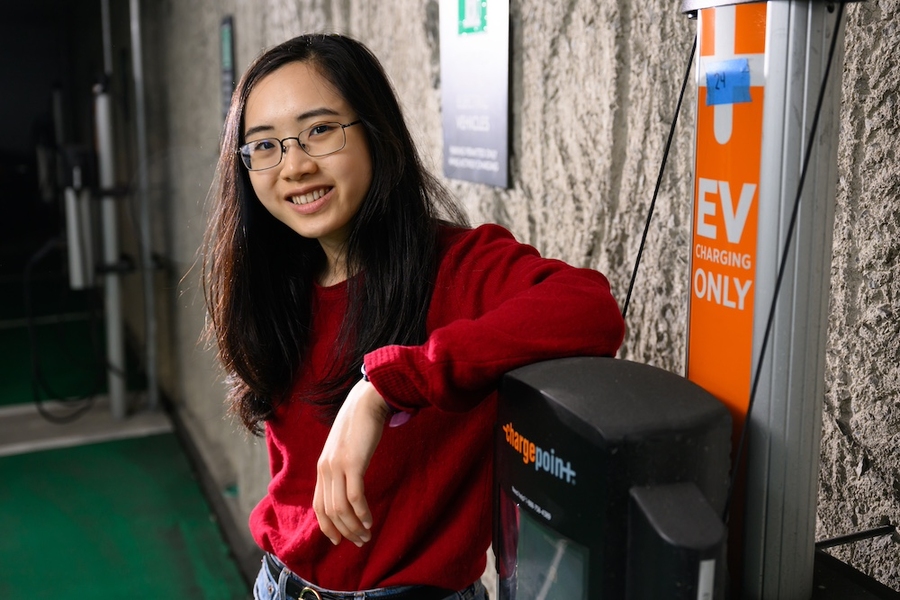
Previous image Next image
MIT senior Elaine Siyu Liu doesn’t own an electric car, or any car. But she sees the impact of electric vehicles (EVs) and renewables on the grid as two pieces of an energy puzzle she wants to solve.
The U.S. Department of Energy reports that the number of public and private EV charging ports nearly doubled in the past three years, and many more are in the works. Users expect to plug in at their convenience, charge up, and drive away. But what if the grid can’t handle it?
Electricity demand, long stagnant in the United States, has spiked due to EVs, data centers that drive artificial intelligence, and industry. Grid planners forecast an increase of 2.6 percent to 4.7 percent in electricity demand over the next five years, according to data reported to federal regulators. Everyone from EV charging-station operators to utility-system operators needs help navigating a system in flux.
That’s where Liu’s work comes in.
Liu, who is studying mathematics and electrical engineering and computer science (EECS), is interested in distribution — how to get electricity from a centralized location to consumers. “I see power systems as a good venue for theoretical research as an application tool,” she says. “I'm interested in it because I'm familiar with the optimization and probability techniques used to map this level of problem.”
Liu grew up in Beijing, then after middle school moved with her parents to Canada and enrolled in a prep school in Oakville, Ontario, 30 miles outside Toronto.
Liu stumbled upon an opportunity to take part in a regional math competition and eventually started a math club, but at the time, the school’s culture surrounding math surprised her. Being exposed to what seemed to be some students’ aversion to math, she says, “I don’t think my feelings about math changed. I think my feelings about how people feel about math changed.”
Liu brought her passion for math to MIT. The summer after her sophomore year, she took on the first of the two Undergraduate Research Opportunity Program projects she completed with electric power system expert Marija Ilić, a joint adjunct professor in EECS and a senior research scientist at the MIT Laboratory for Information and Decision Systems.
Predicting the grid
Since 2022, with the help of funding from the MIT Energy Initiative (MITEI), Liu has been working with Ilić on identifying ways in which the grid is challenged.
One factor is the addition of renewables to the energy pipeline. A gap in wind or sun might cause a lag in power generation. If this lag occurs during peak demand, it could mean trouble for a grid already taxed by extreme weather and other unforeseen events.
If you think of the grid as a network of dozens of interconnected parts, once an element in the network fails — say, a tree downs a transmission line — the electricity that used to go through that line needs to be rerouted. This may overload other lines, creating what’s known as a cascade failure.
“This all happens really quickly and has very large downstream effects,” Liu says. “Millions of people will have instant blackouts.”
Even if the system can handle a single downed line, Liu notes that “the nuance is that there are now a lot of renewables, and renewables are less predictable. You can't predict a gap in wind or sun. When such things happen, there’s suddenly not enough generation and too much demand. So the same kind of failure would happen, but on a larger and more uncontrollable scale.”
Renewables’ varying output has the added complication of causing voltage fluctuations. “We plug in our devices expecting a voltage of 110, but because of oscillations, you will never get exactly 110,” Liu says. “So even when you can deliver enough electricity, if you can't deliver it at the specific voltage level that is required, that’s a problem.”
Liu and Ilić are building a model to predict how and when the grid might fail. Lacking access to privatized data, Liu runs her models with European industry data and test cases made available to universities. “I have a fake power grid that I run my experiments on,” she says. “You can take the same tool and run it on the real power grid.”
Liu’s model predicts cascade failures as they evolve. Supply from a wind generator, for example, might drop precipitously over the course of an hour. The model analyzes which substations and which households will be affected. “After we know we need to do something, this prediction tool can enable system operators to strategically intervene ahead of time,” Liu says.
Dictating price and power
Last year, Liu turned her attention to EVs, which provide a different kind of challenge than renewables.
In 2022, S&P Global reported that lawmakers argued that the U.S. Federal Energy Regulatory Commission’s (FERC) wholesale power rate structure was unfair for EV charging station operators.
In addition to operators paying by the kilowatt-hour, some also pay more for electricity during peak demand hours. Only a few EVs charging up during those hours could result in higher costs for the operator even if their overall energy use is low.
Anticipating how much power EVs will need is more complex than predicting energy needed for, say, heating and cooling. Unlike buildings, EVs move around, making it difficult to predict energy consumption at any given time. “If users don't like the price at one charging station or how long the line is, they'll go somewhere else,” Liu says. “Where to allocate EV chargers is a problem that a lot of people are dealing with right now.”
One approach would be for FERC to dictate to EV users when and where to charge and what price they'll pay. To Liu, this isn’t an attractive option. “No one likes to be told what to do,” she says.
Liu is looking at optimizing a market-based solution that would be acceptable to top-level energy producers — wind and solar farms and nuclear plants — all the way down to the municipal aggregators that secure electricity at competitive rates and oversee distribution to the consumer.
Analyzing the location, movement, and behavior patterns of all the EVs driven daily in Boston and other major energy hubs, she notes, could help demand aggregators determine where to place EV chargers and how much to charge consumers, akin to Walmart deciding how much to mark up wholesale eggs in different markets.
Last year, Liu presented the work at MITEI’s annual research conference. This spring, Liu and Ilić are submitting a paper on the market optimization analysis to a journal of the Institute of Electrical and Electronics Engineers.
Liu has come to terms with her early introduction to attitudes toward STEM that struck her as markedly different from those in China. She says, “I think the (prep) school had a very strong ‘math is for nerds’ vibe, especially for girls. There was a ‘why are you giving yourself more work?’ kind of mentality. But over time, I just learned to disregard that.”
After graduation, Liu, the only undergraduate researcher in Ilić’s MIT Electric Energy Systems Group, plans to apply to fellowships and graduate programs in EECS, applied math, and operations research.
Based on her analysis, Liu says that the market could effectively determine the price and availability of charging stations. Offering incentives for EV owners to charge during the day instead of at night when demand is high could help avoid grid overload and prevent extra costs to operators. “People would still retain the ability to go to a different charging station if they chose to,” she says. “I'm arguing that this works.”
Share this news article on:
Related links.
- Electric Energy Systems Group
- MIT Energy Initiative
- Department of Electrical Engineering and Computer Science
- Department of Mathematics
Related Topics
- Electrical engineering and computer science (EECS)
- Mathematics
- Laboratory for Information and Decision Systems (LIDS)
- Undergraduate Research Opportunities Program (UROP)
- Renewable energy
- Electricity
- Electric vehicles
- Undergraduate
Related Articles
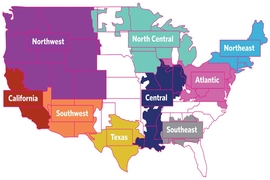
Cutting carbon emissions on the US power grid
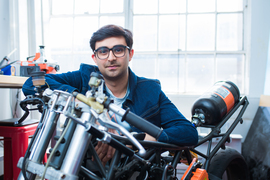
Designing cleaner vehicles
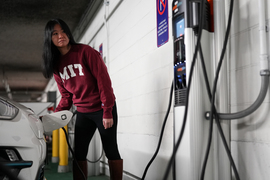
Minimizing electric vehicles’ impact on the grid
Previous item Next item
More MIT News

Understanding why autism symptoms sometimes improve amid fever
Read full story →
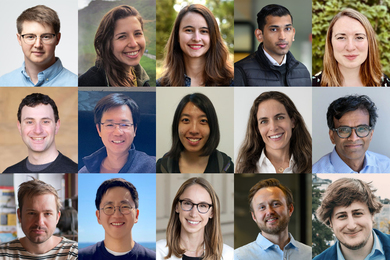
School of Engineering welcomes new faculty

Study explains why the brain can robustly recognize images, even without color
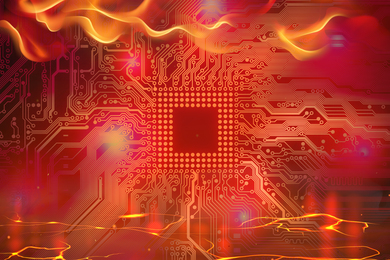
Turning up the heat on next-generation semiconductors
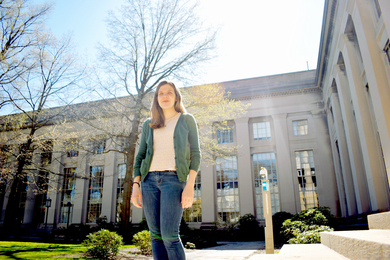
Sarah Millholland receives 2024 Vera Rubin Early Career Award

A community collaboration for progress
- More news on MIT News homepage →
Massachusetts Institute of Technology 77 Massachusetts Avenue, Cambridge, MA, USA
- Map (opens in new window)
- Events (opens in new window)
- People (opens in new window)
- Careers (opens in new window)
- Accessibility
- Social Media Hub
- MIT on Facebook
- MIT on YouTube
- MIT on Instagram
- UB Directory
- Office of the Provost >
- Resources >
Study enhancing learning methods for AI and machine learning systems wins IEEE award

By Peter Murphy
Published May 21, 2024
A paper authored by Seyyedali Hosseinalipour (Ali Alipour) received the Institute of Electrical and Electronics Engineers (IEEE) Communications Society William R. Bennett Prize. The research could enhance learning methods used by artificial intelligence (AI) and machine learning (ML) systems.
Related Links
- Seyyedali Hosseinalipour (Ali Alipour) , PhD
- 3/12/24 Department of Electrical Engineering
According to IEEE, the award “recognizes outstanding original papers published in IEEE/ACM Transactions on Networking or the IEEE Transactions on Network and Service Management” within the last three years.
Alipour’s research enhances federated learning, a method researchers use to secure private information while collecting data to better train AI and ML systems.
AI and ML systems collect data from various sources to enhance their capabilities. The data collection associated with each of these methods, however, come with privacy concerns. Data collected from personal devices like smartphones and other electronics could be stored in a single location, like a cloud server. Federated learning allows the data to remain on the device. The only data sent to a central server during federated learning is the AI or ML model parameters.
“Federated learning was first developed by researchers at Google, initially aimed at enhancing next-word prediction for smartphone keyboards,” Alipour says. “Today, technology giants like NVIDIA apply federated learning to sectors such as healthcare, where protecting patient data privacy is crucial,” Alipour says.
Alipour’s new method, multi-stage hybrid federated learning (MH-FL), allows devices to interact with each other before sending any information to a server. The devices can work together to refine learning methods associated with the AI and ML systems before sharing information to a central server.
“MH-FL introduces an additional layer of flexibility by enabling client-to-client interactions, also known as device-to-device interactions. Our findings indicate that incorporating this degree of freedom can significantly enhance model prediction performance in federated learning,” Alipour says. “Additionally, it contributes to reduced energy consumption and latency, optimizing both the efficiency and effectiveness of the learning process.”

The work in this award-winning paper has set the foundation for Alipour’s work with federated learning. He has continued to develop and explore different federated learning techniques.
“Ali is a leading researcher in the analysis and modeling of modern wireless networks, specifically in the application of machine-learning techniques to the design and implementation of next-generation wireless networks,” says Jon Bird, professor and chair in the Department of Electrical Engineering. “This achievement is especially remarkable for Ali, given his current position as a junior assistant professor.”
The William R. Bennett Prize is competitive. Out of the potentially thousands of papers considered, just one is selected for the award.
“As researchers, we are always thrilled when our ideas are well-received. I hope to use this excitement as motivation to continue contributing to the rapidly evolving fields of AI and ML,” Alipour says. “I also hope that this enthusiasm not only drives our current research but inspires further innovations and discoveries.”
Do you have questions or comments for the Office of the Provost? Let us know your thoughts and we’ll be happy to get back to you.
PhD Excellence Initiative
A campus-wide, student-centric effort to ensure that UB’s PhD programs remain among the strongest in the world.
Recent University News
- 5/23/24 Conference at UB to address youth mental health crisis
- 5/23/24 UBIT partners with Cybersecurity Club
- 5/23/24 BEOC honors four alumni for their path to success
- 5/23/24 UB dental professor brings AI into classroom; shows students how it can advance periodontal treatment
The PhD Council Podcast dives into the world of PhD life at TU Delft's Electrical Engineering, Mathematics and Computer Science Faculty (EEMCS). We cover research, challenges, and practical tips. We interview PhDs, professors, and postdocs to share their experiences and insights, helping fellow PhD candidates navigate their academic journey effectively. Join us for candid discussions and valuable advice to make the most of your doctoral studies.
PhD Life by PhD Council PhD Council
- APR 17, 2024
PhD Deep Dive: Youri Blom
The sixth episode in our series, in which we dive deep into topics that PhDs in our faculty are working on. Youri's PhD is on Photovoltaic Materials and Devices in the department of Electrical Sustainable Energy. The group specializes in applying advanced measurement techniques in combination with computer modeling for determination of (opto-) electronic properties, such as the density of defects in thin layers of disordered materials. The acquired expertise is used for the optimiz...
PhD Deep Dive: Willem de Muinck Keizer
The fourth episode in our series, in which we dive deep into topics that PhDs in our faculty are working on. Willem de Muinck Keizer is a PhD student at the Discrete Mathematics and Optimization group at the TU Delft. He works in semidefinite programming, which is a type of optimization problem with applications in and outside of Mathematics.
PhD Deep Dive: Lorena Poenaru-Olaru
The third episode in our series, in which we dive deep into topics that PhDs in our faculty are working on. Lorena's goal is to create a systematic method of monitoring and maintaining machine learning models in production against concept drift (data shifts). As part of the AI4FinTech Lab, I am enhancing the collaboration between academia (TU Delft) and industry (ING).
PhD Deep Dive: Ids van der Werf
The second episode in our series, in which we dive deep into topics that PhDs in our faculty are working on. Starting in August 2022, Ids is a PhD student at SPS with Richard Hendriks, working on a project about underwater communications, more specifically about creating a high bandwidth, doppler tolerant communication link. The project is a collaboration between TNO (a dutch research institute), the NLDA (Dutch defence academy) and the TU Delft.
PhD Deep Dive: Carolina Centeio Jorge
First episode in our series, in which we dive deep into topics that PhDs in our faculty are working on. Since October 2020, Carolina is a PhD student at the Interactive Intelligence group of TU Delft. Her PhD has a special focus on mental models in the context of human‐AI teams, such as enabling artificial agents (e.g., robots) to understand and predict human teammates and effectively act accordingly. Carolina's main research interests lie in Behaviour Analysis and Pattern Recognition.
- © 2024 PhD Life by PhD Council
Top Podcasts In Education
School of Electrical and Computer Engineering
College of engineering, zheng wins best paper award for advanced packaging technologies.
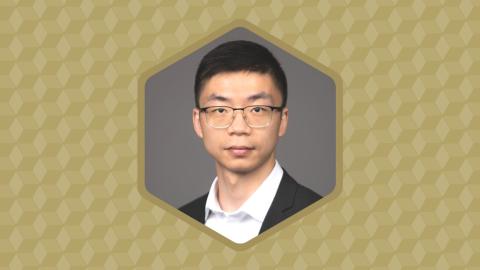
The ECE Ph.D. alumni won the award for his research on fused-silica stitch-chip technology for RF/mm-wave multichiplet modules.
Georgia Tech School of Electrical and Computer Engineering graduate Ting Zheng won an IEEE Transactions on Components, Packaging and Manufacturing Technology (TCPMT) Best Paper Award, from the Advanced Packaging Category, for his research on fused-silica stitch-chip technology.
TCPMT is the flagship journal of the IEEE Electronics Packaging Society (EPS).
He was recognized for the paper he co-authored prior to his graduation, “Benchmarking and Demonstration of Low-Loss Fused-Silica Stitch-Chips with Compressible Microinterconnects for RF/mm-Wave Chiplet-Based Modules.”
It proposes and benchmarks ‘fused-silica stitch-chips’ as an interconnect technology between neighboring RF/mm-wave chiplets. Compared to conventional advanced packaging technologies, the stitch-chips enable low-loss and broadband interconnection, provide built-in mechanical deformation capability to compensate for differing chiplets heights, and provide a path towards package size scaling for large-scale multichiplet integration.
He was advised by ECE Professor and 3D Systems Packaging Research Center Director Muhannad Bakir.
Zheng is the second student from Bakir’s Integrated 3D Systems Lab to have their research recognized. Shengtao Yu won the Intel Outstanding Student Paper Award for this paper on co-packaged optics and fiber-chiplet-connectors at the 2023 IEEE Electronic Components and Technology Conference (ECTC), which is the flagship conference of IEEE EPS.
It is a rare honor for the same research group to win paper awards in the same year from both ECTC and TCPMT.
At the end of May, Zheng, Yu and Bakir will all attend ECTC 2024 in Denver, CO to receive the ECTC and TCPMT paper awards.
Zack Winiecki

Current time by city
For example, New York
Current time by country
For example, Japan
Time difference
For example, London
For example, Dubai
Coordinates
For example, Hong Kong
For example, Delhi
For example, Sydney
Sunrise and sunset times, day length in Krasnodar, Krasnodar Krai, Russia
Sunrise and sunset by city
Sunrise and sunset calendar — Krasnodar, Russia
Twilight calendar — krasnodar, russia.
During civil twilight the geometric center of the sun is between 0 and 6 degrees below the horizon. Objects are clearly distinguished without artificial light.
During nautical twilight the center of the sun is between 6 and 12 degrees below the horizon. Sailors can navigate, using a visible horizon as reference.
During astronomical twilight the center of the sun is between 12 and 18 degrees below the horizon. Between the end of astronomical twilight in the evening and the beginning of astronomical twilight in the morning, the sky is dark enough for all astronomical observations.
Krasnodar, Russia

CVPR Paper Highlight: Building 3D-aware AI from 2D image data

Shijie Zhou, a PhD student advised by Prof. Achuta Kadambi at UCLA Henry Samueli School of Engineering, has received the Highlight Paper award for the paper titled “Feature 3DGS: Supercharging 3D Gaussian Splatting to Enable Distilled Feature Fields.” The award was received at the IEEE Computer Vision and Pattern Recognition (CVPR), which will take place in Seattle, Washington, in June 2024. CVPR is a top research venue in AI with an impact factor comparable to Nature, Science, and New England Journal of Medicine. Being further recognized as one of the Highlight papers of CVPR is therefore a notable honor for the research team.
“This research paper addresses a long standing puzzle in computer vision: namely the input data for vision are 2-dimensional (2D) photographs but the inferences we want to make about the world are 3-dimensional, like “where is an object located?” or “what path should a robot traverse?”. Therefore, while AI models built on 2D photos have powerful capabilities, it would be possible to unlock more capabilities if these models were to become increasingly aware of the 3-dimensional (3D) world. Example use cases that can benefit robot navigation, autonomous driving, robotic surgery on 3-dimensional biological organs, and many more.” says Zhou, the first author of the paper.
Unfortunately, when AI models are trained on 2D data, obtaining 3D awareness is not straightforward: an algorithm can be developed to “lift” the 2D feature representation to 3D feature representations, but this is an underdetermined inverse problem that is also compute constrained. To solve this problem, the paper renders the possible 3D light paths using a Gaussian radiance field representation, which constrains the 3D representation to a parametric representation. In contrast to a neural network, such an approach is faster, but has a drawback in rendering high-dimensional feature embedding. This is due to inconsistencies in spatial resolution and feature channels compared to RGB images. The paper introduces a further key contribution — a Parallel N-dimensional Gaussian Rasterizer — to motivate solutions for algorithmic speed and quality.
“3D datasets are comparably rare, requiring specialized sensing hardware. At the moment, and for the foreseeable future, the largest scale computer vision datasets are made of 2D images and videos. So there is a need for algorithmic methods that can extract 3D awareness from 2D input data. It’s hard to achieve because 3D cues are only partially present in 2D photos, but it makes for an exciting research problem, with practical impact”, says Achuta Kadambi, an Assistant Professor at UCLA in Electrical Engineering and Computer Science, and a senior author of the paper.
“Distilling 2D Foundation Models into 3D scene representations is an exciting avenue towards 3D scene understanding”, says Vincent Sitzmann, an Assistant Professor at MIT of Electrical Engineering and Computer Science, who was not involved in the research. “This paper takes a great step towards accelerating feature fields dramatically via Gaussian Splatting, unlocking feature fields across many applications which previously would have been intractable”. Sitzmann further notes that new applications could include those “ranging from 3D editing in computer graphics to robotic manipulation.”
Currently, the paper demonstrates results on a smaller set of applications in computer vision that include 3D semantic scene understanding, language-guided scene editing, and promptable segmentation in 3D scenes. All tasks were completed at ultra-fast inference speeds with results that outperform previous baselines in speed (2.7x faster feature rendering) and performance (23% improvement on a range of downstream tasks). These results are a significant step for “the foundations for general-purpose AI modeling and contributions to the sciences of computer vision and AI/ML,” says Suya You, a senior researcher of DEVCOM Army Research Laboratory (ARL), and a senior author of the Paper, adding that he is “proud of being part of the research team working with such talented students and faculty” on the work. The work was done in collaboration between the Visual Machines Group at UCLA (VMG) led by Prof. Kadambi, an Army Research Lab (ARL) team led by Dr. Suya You, and the Visual Informatics Group at UT Austin (VITA) led by Prof. Atlas Wang. Project details are available at https://feature-3dgs.github.io/ along with downloadable code and it will be presented as a Highlight Paper this summer at CVPR.

Meet the Outstanding Faculty Award Recipients of 2024
- by Jessica Heath and Matt Marcure
- May 20, 2024
Recognizing excellence in research and teaching, the College of Engineering celebrates its faculty members with outstanding faculty awards yearly. Departments nominate faculty members who are selected to receive the honors by the college's Faculty Awards Committee.
Four faculty members will receive outstanding faculty awards at the College of Engineering Awards Celebration on June 3.
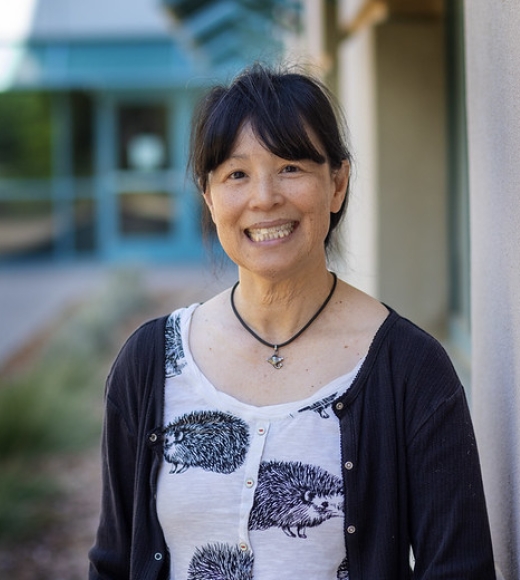
Outstanding Faculty Teaching Award
Angelique louie , biomedical engineering .
Angelique Louie's passion for education has left an indelible mark on the Department of Biomedical Engineering.
It is because of her pioneering work that the department's undergraduate senior design series focuses on training through translational design, offering students the opportunity to solve real-world problems from institutions like the UC Davis School of Veterinary Medicine. Louie has also created several keystone courses for the undergraduate program and has developed classes meant to foster student success, such as one for freshmen and sophomores interested in undergraduate research.
Her dedication to teaching has led to several leadership positions. Louie served as the faculty director of the Undergraduate Research Center from 2013–16 and provided critical support for the university, receiving high-profile awards like the Beckman Scholars Program from the Arnold and Mabel Beckman Foundation. It was also due to her spearheading efforts that the Department of Biomedical Engineering received the first ABET accreditation for its undergraduate program, which ensures graduates have the requisite skills to enter the global workforce.
Louie joined UC Davis in 2002. She received her bachelor's in electrical engineering from UC Davis and holds a master's in electrical engineering from UCLA and a Ph.D. in cell biology from UC Irvine.
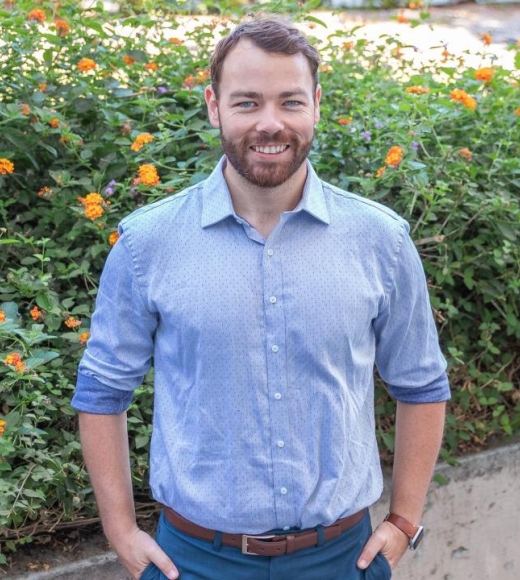
Outstanding Junior Faculty Award
Scott j. mccormack , materials science and engineering .
An expert in high-temperature ceramics, Scott McCormack joined the college in 2019, where he applies his skills in materials synthesis, crystallography and calorimetry for the discovery of new materials that can withstand the harshest conditions, like ultra-high temperatures, for applications in hypersonic platforms, space exploration and nuclear fission and fusion reactors.
To experiment on materials at temperatures up to 4,000 degrees Celsius, McCormack designed an environmental conical nozzle levitator with dual-wavelength lasers to study ultra-high temperature materials and ceramics in a controlled, container-free environment.
McCormack is currently involved in two projects funded by the Air Force Office of Scientific Research. He is the lead PI on a congressionally funded program that focuses on using ultra-high-temperature ceramics for hypersonic platform manufacturing. He also serves as co-PI on a project supported through the office's Multi-University Research Initiative, which focuses on investigating compositionally complex ceramics for hypersonic platforms.
McCormack earned his bachelor's degree in materials engineering from the University of Wollongong in Australia and his Ph.D. in materials science and engineering from the University of Illinois at Urbana-Champaign. He received an NSF CAREER Award in 2021 and an Excellence in Teaching Award from the UC Davis College of Engineering in 2023.
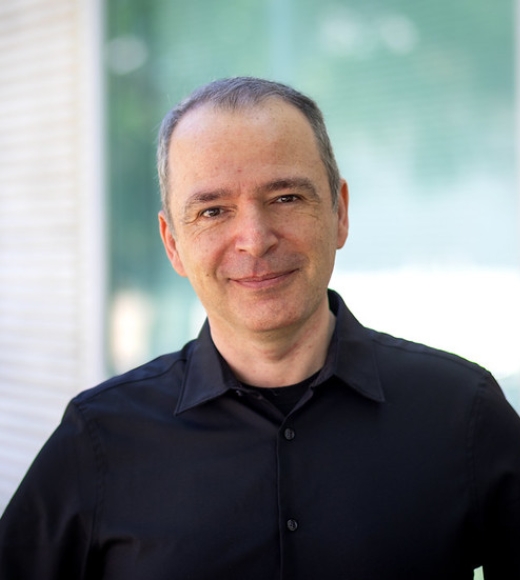
Outstanding Mid-Career Faculty Award
Vladimir filkov , computer science .
Vladimir Filkov turns working with data into an art form by seeing what is possible within the details. A consummate data scientist, Filkov has been applying data science, AI and machine learning methods to several areas including software engineering, life sciences and, most recently, medicine.
Since arriving at UC Davis in 2002, his contributions have been recognized many times over, including five Distinguished Paper Awards and two Test of Time Awards from the Association for Computing Machinery, or ACM, International Conference on the Foundations of Software Engineering. The latter honors were for his formative papers on the community structure within open-source software projects and the potential impact of biased datasets on the performance of prediction techniques of bug-detection software.
As the director of translational data science for the UC Davis DataLab, Filkov oversees projects and programs that build data science bridges with UC Davis Health. In one such project with UC Davis doctors, he and his team developed and deployed a model of patient admissions during the pandemic, used daily by nurses and doctors to anticipate resource needs.
Filkov received his M.S. and Ph.D. in computer science at Stony Brook University. He was named an ACM Distinguished Member in 2020.
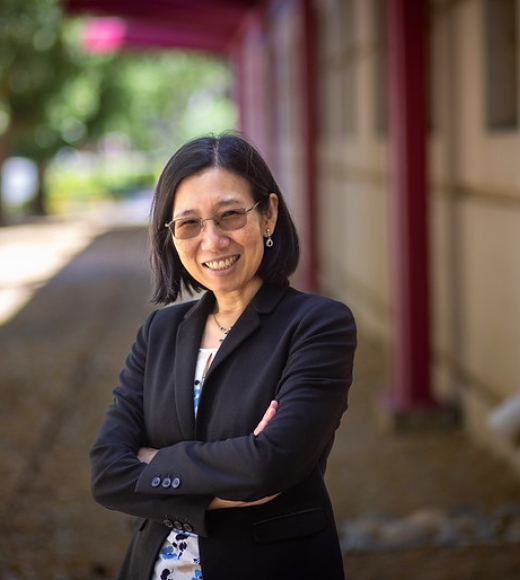
Outstanding Senior Faculty Award
Chen-nee chuah , electrical and computer engineering .
A global leader in communication networks and data science, Chen-Nee Chuah has published over 240 refereed papers on networking, cybersecurity and machine learning. Her significant contributions include the development of Multiple-Input-Multiple-Output wireless systems (resulting in Wi-Fi networks dozens of times faster than previous models) and large-scale internet measurement techniques. Recently, Chuah has focused on leveraging smart devices and edge intelligence to improve on- and off-site medical care.
Chuah has led or co-led 19 NSF, NIH and DoD funded projects, including a recent NSF TRIPOD award that has helped establish UC Davis as a data science hub, as well as grants through the UC Noyce Initiative to advance cybersecurity and computational health. She has also received the UC Davis ADVANCE award for her commitment to increasing opportunities for women in engineering and computer science and recently became a fellow of the American Association for the Advancement of Science.
Before joining UC Davis in 2002, Chuah earned her Ph.D. and master's from the Department of Electrical Engineering and Computer Sciences at UC Berkeley. She is the first woman to hold the title of Child Family Endowed Professorship in Engineering, a distinction she received for her nationally recognized scholarship.
Primary Category
Secondary categories.

College Honors ECE Graduate Student for Excellence in Research
- by Matt Marcure
- May 23, 2024
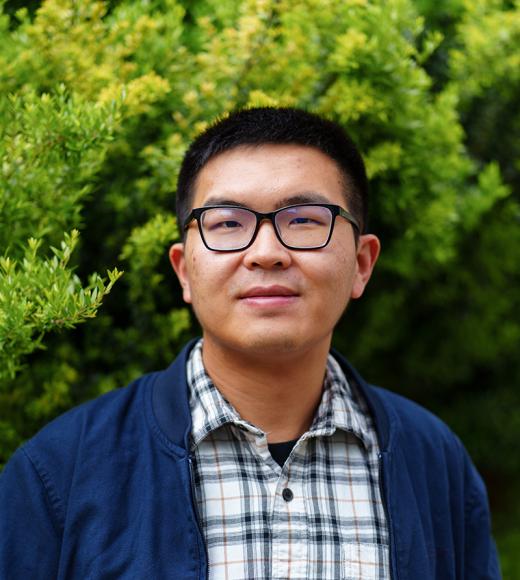
Zhengfeng (Jeff) Lai has received the 2024 Excellence in Graduate Student Research award from the College of Engineering, recognizing the work he completed throughout his Ph.D. program in the Department of Electrical and Computer Engineering. The honor is part of the annual College of Engineering Graduate Student Excellence awards that celebrate student contributions to research, service, safety and DEI.
Lai's research stands to advance the possibilities of computer vision and machine learning. Throughout his graduate program, he published 14 articles (11 first-authored), which have already received over 200 citations.
Notably, Lai won a Best Paper Award at the 2022 Conference on Computer Vision and Pattern Recognition for pioneering research on a semi-supervised learning framework that does not make assumptions about unlabeled data. While pursuing his doctorate, he also filed a patent application for a project where he successfully applied machine learning to detect congenital heart disease in newborns.
Lai graduated in December 2023 and currently works as a machine learning research scientist at Apple, where he has revolutionized the company's use of large-scale pre-training and multimodal modeling.
Meet all the awardees
Primary Category

IMAGES
VIDEO
COMMENTS
We have a large and vibrant community of doctoral students researching a broad range of topics in electronic and electrical engineering. Our graduates are in high demand, going on to careers in industry, academic research, and permanent academic positions at top institutions. Many of our graduates now hold senior positions in the industry.
Postgraduate research. Our graduate research programmes put you at the forefront of human knowledge. Studying at UCL Engineering, you'll have the resources and stimulating environment you need to achieve your potential. You will work towards a PhD or EngD qualification and at the end of your time with us you will produce a doctoral thesis ...
Electronic and Electrical Engineering MPhil/PhD UCL (University College London) Add to favourites GET MORE INFO Course options. 2 options available Qualification. PhD/DPhil - Doctor of Philosophy. Location. UCL (University College London) Study mode. Full time. Start date. 23-SEP-24. Duration. 3 years. COURSE SUMMARY; MODULES;
Thanks to the breadth of research we carry out in the department, we offer doctorates across a wide range of topics in electrical engineering from nanotechnology and novel materials, to circuits and systems, radar, communications, photonics and optical networks and large scale networks. We collaborate widely, both with other departments in UCL ...
Welcome to the Department of Electronic and Electrical Engineering (EEE), UCL; the first department of electrical technology in England, homed within UCL, a world top 10 university and The Times ...
UCL (University College London) 5 years Customised degree. 1 year Full time degree: £21,200 per year (UK) 2 years Part time degree: £10,600 per year (UK) Modules. Apply now Visit website Request info.
🎓 Exciting PhD Opportunity at UCL's Electronic & Electrical Engineering Department! We're seeking a motivated candidate to join the Marie Skłodowska-Curie…
Apr 29, 2024. 0M 341. Find out which universities are the best in the world for Engineering - Electrical and Electronic. in the QS World University Rankings by Subject 2022.
Interested in getting a PhD from a world-renowned research team at a global top 10 ... Below are all the available EPSRC DTP projects from UCL's Electronic and Electrical Engineering department ...
University College London is one of the world's most prestigious universities, ranking 8th globally in the QS World University Rankings 2023 and being a perennial top ten UK university in almost all major rankings over many years. UCL currently ranks 5th in the UK for Engineering and Technology (QS 2022) and its Department of Electronic and Electrical Engineering is one of the best in the world.
Average Earnings. £33,000. 15 months after the course for Electrical and electronic engineering graduates at UCL. Employment. 90%. go on to work and/or study. 15 months after the course for Electrical and electronic engineering graduates at UCL. 80%.
ADDRESS. Electrical & Computer Engineering Graduate Program at UCLA. 420 Westwood Plaza. 57-127 Engineering IV, attn: Office of Graduate Student Affairs. Box 951594. Los Angeles, CA 90095-1594.
The Electrical Engineering PhD degree requires a minimum of 72 credit hours beyond the bachelor's degree. Of these 72 hours, a minimum of 36 credit hours must be formal coursework, exclusive of independent study coursework. A minimum of 15 credit hours with up to a maximum of 24 credit hours of dissertation hours can be credited toward the degree.
The Electrical Engineering PhD program studies systems that sense, analyze, and interact with the world. You will learn how this practice is based on fundamental science and mathematics, creating opportunities for both theoretical and experimental research. Electrical engineers invent devices for sensing and actuation, designing physical ...
The PhD position would suit applicants with undergraduate or master's degrees in physics, medical physics, biomedical engineering, electrical engineering, or other relevant area, and have a 1 st or 2:1 degree or equivalent. Programming skills, lab work and scientific writing experience are desirable.
Email: [email protected]. Phone: 617-715-5279. MIT Energy Initiative. Close. Caption. With a double major in mathematics and electrical engineering and computer science, Elaine Siyu Liu is interested in distribution — how to get electricity from a centralized location to consumers. Credits. Photo: Gretchen Ertl.
A paper authored by Seyyedali Hosseinalipour (Ali Alipour) received the Institute of Electrical and Electronics Engineers (IEEE) Communications Society William R. Bennett Prize. The research could enhance learning methods used by artificial intelligence (AI) and machine learning (ML) systems.
5 episodes. The PhD Council Podcast dives into the world of PhD life at TU Delft's Electrical Engineering, Mathematics and Computer Science Faculty (EEMCS). We cover research, challenges, and practical tips. We interview PhDs, professors, and postdocs to share their experiences and insights, helping fellow PhD candidates navigate their academic ...
Georgia Tech School of Electrical and Computer Engineering graduate Ting Zheng won an IEEE Transactions on Components, Packaging and Manufacturing Technology (TCPMT) Best Paper Award, from the Advanced Packaging Category, for his research on fused-silica stitch-chip technology.TCPMT is the flagship journal of the IEEE Electronics Packaging Society (EPS).
This week, UCL Engineering had the honour of hosting Chi Onwurah MP, Shadow Minister for Science, Research, and Innovation, for a thought provoking discussion on the future of #AI. As part of her ...
Sunrise and sunset times, day length, and twilight in Krasnodar, Krasnodar Krai, Russia today and for the current month.
Shijie Zhou, a PhD student advised by Prof. Achuta Kadambi at UCLA Henry Samueli School of Engineering, has received the Highlight Paper award for the paper titled "Feature 3DGS: Supercharging 3D Gaussian Splatting to Enable Distilled Feature Fields." ... an Assistant Professor at UCLA in Electrical Engineering and Computer Science, and a ...
Outstanding Junior Faculty Award Scott J. McCormack, Materials Science and Engineering . An expert in high-temperature ceramics, Scott McCormack joined the college in 2019, where he applies his skills in materials synthesis, crystallography and calorimetry for the discovery of new materials that can withstand the harshest conditions, like ultra-high temperatures, for applications in hypersonic ...
by Matt Marcure. May 23, 2024. Zhengfeng (Jeff) Lai has received the 2024 Excellence in Graduate Student Research award from the College of Engineering, recognizing the work he completed throughout his Ph.D. program in the Department of Electrical and Computer Engineering. The honor is part of the annual College of Engineering Graduate Student ...
Kevin Hermstein, a first-year electrical engineering MS/PhD student in the Wireless and Mobile Networking Lab, led by Prof. Gil Zussman, has won a 2024 National Defense Science and Engineering Graduate Fellowship award.He was chosen based on his academic achievements in Science, Technology, Engineering, and Mathematics (STEM) from a total of 3392 applicants.